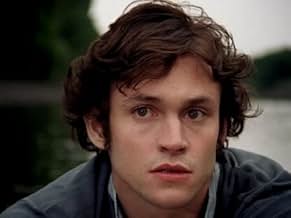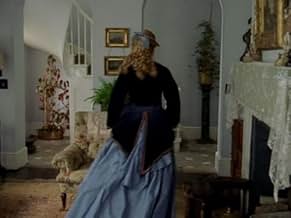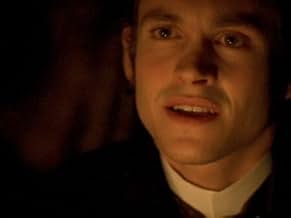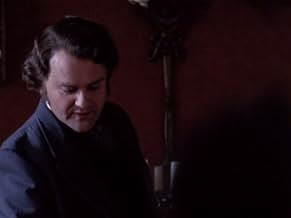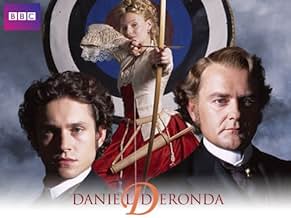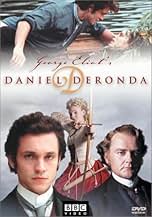Daniel Deronda
- Mini-série télévisée
- 2002
- 53min
Gwendolen Harleth est attirée par Daniel Deronda, un gentleman généreux et intelligent de parents inconnus, mais son propre besoin désespéré de sécurité financière pourrait détruire sa tranq... Tout lireGwendolen Harleth est attirée par Daniel Deronda, un gentleman généreux et intelligent de parents inconnus, mais son propre besoin désespéré de sécurité financière pourrait détruire sa tranquillité.Gwendolen Harleth est attirée par Daniel Deronda, un gentleman généreux et intelligent de parents inconnus, mais son propre besoin désespéré de sécurité financière pourrait détruire sa tranquillité.
- Victoire aux 3 BAFTA Awards
- 5 victoires et 4 nominations au total
Parcourir les épisodes
Avis à la une
7=G=
"Daniel Deronda" is a worthy knock-off of George Eliot's novel of the same name which tells of a young Englishman's search for meaning and purpose while enjoying a life of property and leisure. As with most Victorian period costume dramas out of the UK, this film is sumptuously appointed and well represented by the players and places as it meanders through the usual multiplicity of relationships from aristocrat to pauper with a Jewish thread for distinction. "Daniel Deronda" conjures a range of characters from a stoic martinet to a spoiled beauty to an attractive Jewess and beyond with love, greed, envy, guile, and death all swirling around the Deronda character as it manages to sort itself out with a coherent story arc and a more or less happy ending. A "should see" for anyone into Victorian flicks. (B)
Mary Anne Evans finished writing "Daniel Deronda" in 1876. It was the last of several novels she wrote under the pen name, George Eliot. She was 57 at the time and would live but four more years. Among more than 40 fiction writers of the period, Eliot was one of the great chroniclers of 19th century English society (Georgian-Victorian).
"Deronda" is also the last of Eliot's books to be scripted for a movie. This rendition by the BBC in three parts is excellent. For the fairly recent filming - 2002, the film makers were able to capture the England of the 1870s very well. The cinematography was excellent, as were the script and direction. The acting was first-rate by the entire cast. As some others have mentioned, Hugh Bonneville excelled in his role of a shrewd, mean, heartless "villain," under the guise of a calm, but indifferent gentleman. Romola Garai and Jodhi May were perfect in their roles, and Hugh Dancy was superb in his slight reserve and humility, matching the character in the book. Edward Fox was on the mark in his supporting role, and all the rest of the cast were terrific.
My rating is down one point from a 10 only because of the slight disjointedness in the film. Others have commented on the appearance of two films together, and the difficulty of interweaving them. It wasn't a distraction, but it was noticeable - as though the script should have given us smoother connections between stories. But this is a tremendous film and most enjoyable foray into Victorian England.
I have to give Eliot kudos for one more thing that no one else seemed to comment on. That was the dialog around the table during the Jewish meal. Mordecai said that the Jews would not reach an end to their low esteem until they had a land of their own - in the eastern Mediterranean. What great foresight by a writer 75 years before the worldwide emigration of Jews to the Holy Land after World War II, and the establishment of modern Israel in the late 1940s.
I compliment the BBC for putting Eliot's great books on film, starting in the 1990s. Anglophiles and all of us who enjoy great movies and stories, will cherish these films for years to come. They are a great way to expose the young generation of today with some of the great literature and history of 19th century England.
The world would indeed have loved to have more of Eliot, Charles Dickens, Charlotte Bronte, Jane Austen, Anthony Trollope and Lewis Carroll (Charles Dodgson). Most of them lived a little to a lot longer than the average age of life expectancy at the time. In 1850, that was 40 for males and 42 for females. Trollope (1815-1882) lived to be 67. Eliot (1819-1880) lived to be 61. And Carroll (1822-1898) was 66 when he died. Dickens also beat the average age of death, living to 58 from 1812-1870. But Austen (1775-1817) and Bronte (1816-1855), lived to only 42 and 39, respectively.
"Deronda" is also the last of Eliot's books to be scripted for a movie. This rendition by the BBC in three parts is excellent. For the fairly recent filming - 2002, the film makers were able to capture the England of the 1870s very well. The cinematography was excellent, as were the script and direction. The acting was first-rate by the entire cast. As some others have mentioned, Hugh Bonneville excelled in his role of a shrewd, mean, heartless "villain," under the guise of a calm, but indifferent gentleman. Romola Garai and Jodhi May were perfect in their roles, and Hugh Dancy was superb in his slight reserve and humility, matching the character in the book. Edward Fox was on the mark in his supporting role, and all the rest of the cast were terrific.
My rating is down one point from a 10 only because of the slight disjointedness in the film. Others have commented on the appearance of two films together, and the difficulty of interweaving them. It wasn't a distraction, but it was noticeable - as though the script should have given us smoother connections between stories. But this is a tremendous film and most enjoyable foray into Victorian England.
I have to give Eliot kudos for one more thing that no one else seemed to comment on. That was the dialog around the table during the Jewish meal. Mordecai said that the Jews would not reach an end to their low esteem until they had a land of their own - in the eastern Mediterranean. What great foresight by a writer 75 years before the worldwide emigration of Jews to the Holy Land after World War II, and the establishment of modern Israel in the late 1940s.
I compliment the BBC for putting Eliot's great books on film, starting in the 1990s. Anglophiles and all of us who enjoy great movies and stories, will cherish these films for years to come. They are a great way to expose the young generation of today with some of the great literature and history of 19th century England.
The world would indeed have loved to have more of Eliot, Charles Dickens, Charlotte Bronte, Jane Austen, Anthony Trollope and Lewis Carroll (Charles Dodgson). Most of them lived a little to a lot longer than the average age of life expectancy at the time. In 1850, that was 40 for males and 42 for females. Trollope (1815-1882) lived to be 67. Eliot (1819-1880) lived to be 61. And Carroll (1822-1898) was 66 when he died. Dickens also beat the average age of death, living to 58 from 1812-1870. But Austen (1775-1817) and Bronte (1816-1855), lived to only 42 and 39, respectively.
I'm watching the British series Daniel Deronda every week on Swedish tv, and I will recommned it to everyone who fancies quality literary adaptations. The production values are impeccable, and the acting list very impressive. The one to catch your attention, though, is without a doubt Hugh Bonneville as the supervillain Grandcourt. He's everything a good oldfashioned villain from the 19.th century ought to be: suave, cool, arrogant, manipulative, morally corrupt, and with a razor sharp wit. In fact, he totally overshadows the meek and handsome, but oh so noble and earnest hero, poor Daniel Deronda! Hugh Dancy does his best, but it's hard work to make Deronda as interesting as Grandcourt! Likewise with the heroine. Romola Garai is beautiful to look at, but it's difficult to really care about Gwendolyn. She's such a silly, whiny, and cold person who would rather marry a man she dislikes than stoop to be a governess! It made me long to give her a good whipping! All in all, I think she and Deronda deserve each other, for being so awfully colourless and boring. I'd much rather spend the time watching the villain smirk, or wonder about miss Lapidoth's strange fate, among the Jews. As usual, being the villain pays off! Hugh Bonneville and David Bamber as Lush are the characters you remember! They really are perfectly selfish and dastardly mean!
Having never read George Eliot's novel, I came into the film with only what I know based on the information friends have given me. The film is utterly exquisite. The costuming alone will have Anglophiles like myself crying from sheer envy, and there's enough archery, riding, and balls to weigh out the seriousness of the film, which is essentially two plots woven into one. An utterly heartless and wretched marriage for a spoiled young Gwendolyn in the form of the evil Grandcourt, a landowner whose sole pleasure lies in torment. Be it his wife or dogs, our heartless villain never takes greater pleasure than in dangling something before them and tearing it away again, only to feed it to someone else. We see a kind of barbarism in this act, be it with the family spaniel or his impoverished, abandoned mistress.
The second plot line, which I found slightly less interesting, was about the film's lead, Daniel Deronda, a presumed illigitimate boy who has been raised a country gentleman. One day while out boating he saves a Jewish singer from drowning herself, and sets out to discover his own true identity through finding her family. I don't know why, but I found myself itching through these scenes to get back to Gwendolyn and her pathetic plight of enslavement to her husband. A second viewing, once I knew the course of the characters, settled me a bit.
The acting is very stellar. There's not a weak link in the cast, although I have to say seeing Barbara Hershey seemed a little out of place in this Victorian paradox. The film makes numerous contrasts between good and evil, selfishness and humility, lies and deception. It's actually quite an achievement, and I was pleased at the amount of restraint showed by the filmmakers. The sexual tension between man and wife will go over most younger viewer's heads, something for which I'm grateful. It's rare we get a wonderful Victorian bodice ripper where the bodice stays on.
The second plot line, which I found slightly less interesting, was about the film's lead, Daniel Deronda, a presumed illigitimate boy who has been raised a country gentleman. One day while out boating he saves a Jewish singer from drowning herself, and sets out to discover his own true identity through finding her family. I don't know why, but I found myself itching through these scenes to get back to Gwendolyn and her pathetic plight of enslavement to her husband. A second viewing, once I knew the course of the characters, settled me a bit.
The acting is very stellar. There's not a weak link in the cast, although I have to say seeing Barbara Hershey seemed a little out of place in this Victorian paradox. The film makes numerous contrasts between good and evil, selfishness and humility, lies and deception. It's actually quite an achievement, and I was pleased at the amount of restraint showed by the filmmakers. The sexual tension between man and wife will go over most younger viewer's heads, something for which I'm grateful. It's rare we get a wonderful Victorian bodice ripper where the bodice stays on.
This was one of the more exquisite costume drama adaptations I have seen, with attention to detail absolutely striking in an archery scene that sets the bar for the entire series. Like the novel, it is polarizing in its two stories in one - people seem to either love/hate Daniel's plight or love/hate Gwendolyn's.
Personally, I found Gwendolyn equally annoying in both novel and film. Hugh Darcy, as the eponymous hero, was pretty to look at and delivers a fine, if unremarkable, performance.
But it is Hugh Bonneville as the dastardly Henleigh Grandcourt who took my breath away! He is flawlessly reprehensible, stealing every scene he was in and when he wasn't in a scene, I couldn't wait to see him again! It was terrific seeing Hugh Bonneville in such a role, as he's usually cast in the "very nice guy" roles (Bridget Jones Diary, Iris, Tipping the Velvet, etc). Although he's fine in such roles, as Grandcourt he made my skin crawl with his morally bankrupt, wealthy and pugnacious swagger. LOVED him!
What this series could have used more of was Jodhi May and Greta Scacchi. In difficult supporting roles, both women shine as, respectively, a searching, haunted Jewess and a scorned, bitter mistress. Barbara Hershey makes an appearance late in the series in a pivotal plot device that I won't reveal lest some unsuspecting viewer be bitter with me, and in a limited role gives a performance that reminds us why she became famous in the first place (and at least for this viewer, made me forgive her 'Beaches').
Overall, this adaptation is very enjoyable and recommended viewing for fans of the genre.
Personally, I found Gwendolyn equally annoying in both novel and film. Hugh Darcy, as the eponymous hero, was pretty to look at and delivers a fine, if unremarkable, performance.
But it is Hugh Bonneville as the dastardly Henleigh Grandcourt who took my breath away! He is flawlessly reprehensible, stealing every scene he was in and when he wasn't in a scene, I couldn't wait to see him again! It was terrific seeing Hugh Bonneville in such a role, as he's usually cast in the "very nice guy" roles (Bridget Jones Diary, Iris, Tipping the Velvet, etc). Although he's fine in such roles, as Grandcourt he made my skin crawl with his morally bankrupt, wealthy and pugnacious swagger. LOVED him!
What this series could have used more of was Jodhi May and Greta Scacchi. In difficult supporting roles, both women shine as, respectively, a searching, haunted Jewess and a scorned, bitter mistress. Barbara Hershey makes an appearance late in the series in a pivotal plot device that I won't reveal lest some unsuspecting viewer be bitter with me, and in a limited role gives a performance that reminds us why she became famous in the first place (and at least for this viewer, made me forgive her 'Beaches').
Overall, this adaptation is very enjoyable and recommended viewing for fans of the genre.
Le saviez-vous
- AnecdotesThe novel is set in the early 1860s, whereas the adaptation moves the action ahead to 1874, the year that George Eliot began writing the novel.
- GaffesAt Ezra Cohen's store, the baby's left shoe and sock disappear then reappear.
- ConnexionsFeatured in George Eliot: A Scandalous Life (2002)
Meilleurs choix
Connectez-vous pour évaluer et suivre la liste de favoris afin de recevoir des recommandations personnalisées
- How many seasons does Daniel Deronda have?Alimenté par Alexa
Détails
- Date de sortie
- Pays d’origine
- Sites officiels
- Langue
- Aussi connu sous le nom de
- 丹尼爾的半生緣
- Lieux de tournage
- Édimbourg, Écosse, Royaume-Uni(Jewish market scenes)
- Sociétés de production
- Voir plus de crédits d'entreprise sur IMDbPro
Contribuer à cette page
Suggérer une modification ou ajouter du contenu manquant

